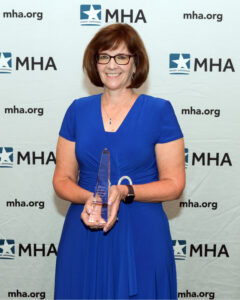
The MHA announced the winners of its 2023 Healthcare Leadership Award June 29 during its Annual Membership Meeting. Each year, the MHA recognizes outstanding individuals who have provided exceptional leadership to healthcare organizations and to the health and well-being of the community. The 2023 recipients are Nancy Susick, MSN, RN, NE-BC, FACHE, chief operating officer, acute & post-acute care, Corewell Health East, and Rudolph Valentini, MD, chief medical officer, Children’s Hospital of Michigan, and group chief medical officer, Detroit Medical Center. The MHA will donate $1,000 on behalf of each award winner to the charity of their choice. These funds were provided to the MHA by the family of former MHA President H. Allen Barth.

When Susick became president of Beaumont Hospital, Troy in 2012, she became the first female and the first nurse to serve as president of a Beaumont Hospital. Her career with Corewell Health East (formerly Beaumont Health) spans nearly four decades, originally beginning as a registered nurse before holding numerous staff, nursing leadership and senior executive administrative positions. Susick has played an integral role in Beaumont Health’s response to the COVID-19 pandemic and leading significant infrastructure projects to expand access to healthcare services.
Susick was actively present throughout the pandemic, regularly rounding the halls of the hospital and providing support to care teams to ensure they had the necessary supplies, equipment and emotional support to safely care for patients, while keeping themselves healthy. She also worked closely with clinical teams to provide opportunities for families to virtually connect with loved ones when visitation policies were suspended.
Prior to her current role, Nancy served as interim president of Beaumont Health and played a key role in leading Beaumont through the integration process between Spectrum Health and Beaumont Health that occurred February 2022. Susick also provided 24 years of service in the United States Navy Reserve, retiring in 2012 with the rank of Captain, having held multiple leadership positions including Commanding Officer and Executive and Training Officer. She has also been involved in supporting several stand-down clinics for veterans providing clinical care, social services and housing resources and continues to be a resource to individuals trying to make decisions for careers in the military.
Susick has asked that the $1,000 monetary portion of the award go to Trinity Community Care in Shelby Township.

Dr. Valentini had dedicated his career towards improving patient care and access. He has been with the hospital staff of Children’s Hospital for Michigan since 1997, including the past 11 years as the chief medical officer. Included in those accomplishments is co-founding the Vasculitis Clinic dedicated to children with autoimmune diseases that affect the kidneys and other organs, starting an outpatient nephrology clinic to increase access to care for patients, and redesigning the Hemodialysis Clinic at Children’s Hospital of Michigan to minimize school absences for patients. He has also made outstanding contributions to the organization’s quality initiatives, playing a key role in reducing hospital-acquired infections to the lowest levels in years by implementing effective measures.
Dr. Valentini’s leadership was instrumental in responding to both the 2022 respiratory syncytial virus (RSV) and influenza outbreak and the COVID-19 pandemic, both internally at the Detroit Medical Center and statewide as a pediatric leader. He helped raise awareness about the link between COVID-19 and pediatric multi-inflammatory syndrome during the COVID-19 pandemic and played a key role in the state’s response to the RSV and influenza outbreak, encouraging collaboration between Children’s Hospital of Michigan and other pediatric hospitals to maximize statewide hospital bed capacity. He also was critical in implementing a command station at Children’s Hospital of Michigan to streamlining the management of the surge in patient volume during that time.
At Valentini’s request, the $1,000 monetary portion of the award will go to the National Kidney Foundation of Michigan in Ann Arbor.
The MHA congratulates the winners of the 2023 MHA Healthcare Leadership Award.
